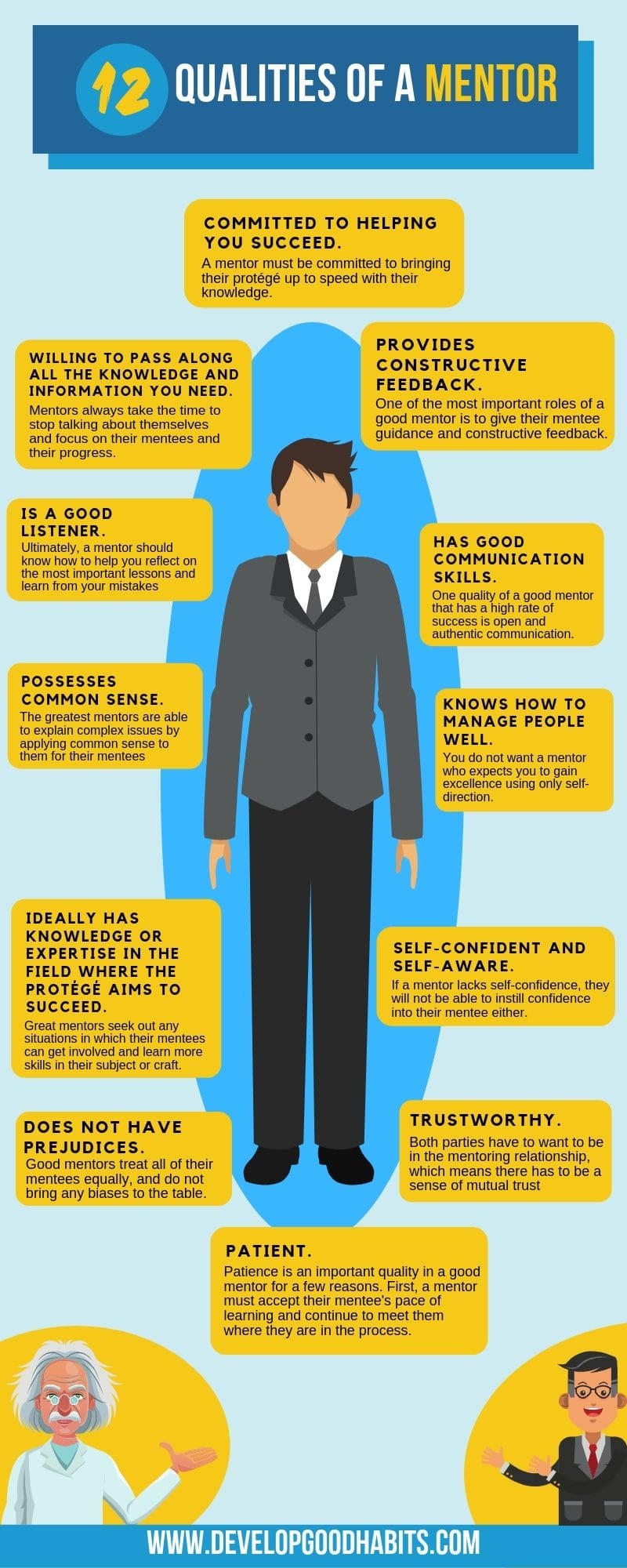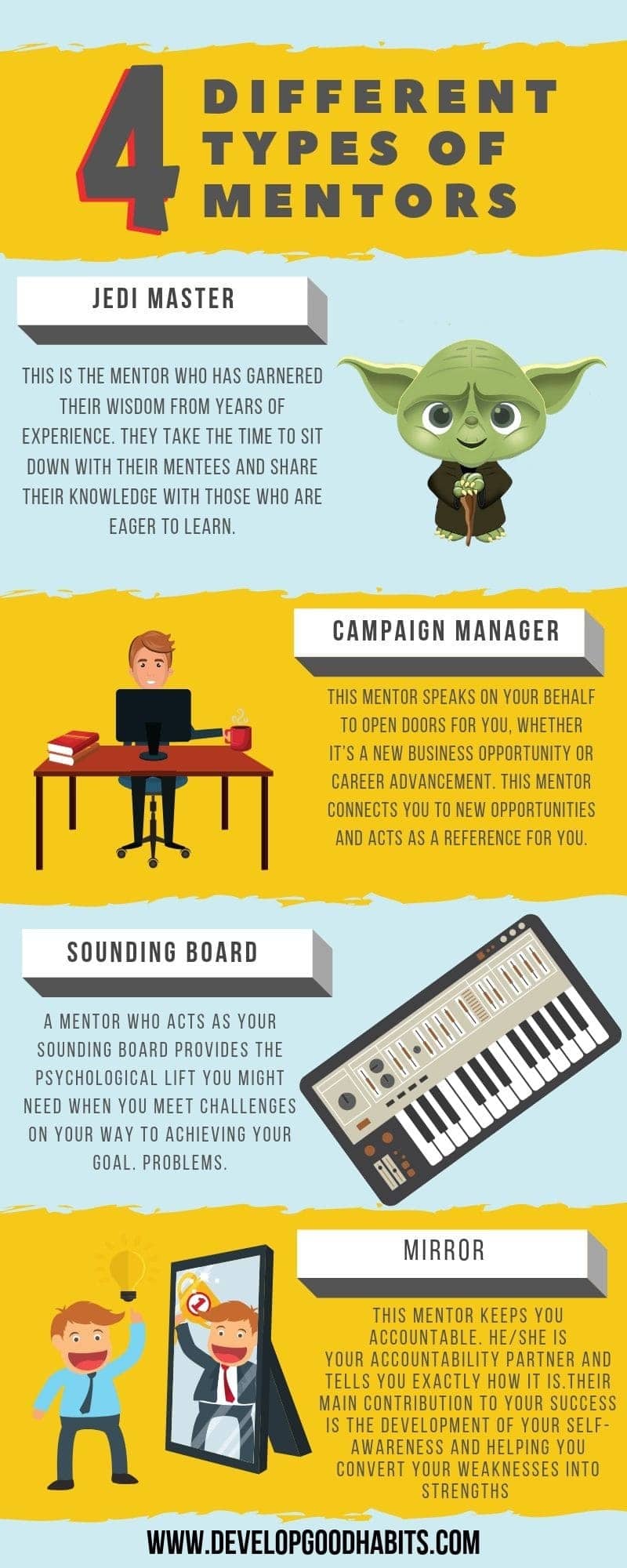We could all use mentors in our lives.
A lot of successful people acknowledge the role that a mentor has played in the success they have. With the right person guiding them, they had access to information and connections that would have been impossible to have if they were doing it alone.
A mentor can unlock many doors for those who have careers, are studying for a degree, venturing into business, have fitness goals, and are pursuing their passions. Moreover, a mentor can be the champion of your cause, or your personal sounding board.
So what is a mentor? And how do you find the right one for your specific goals?
The concept of a mentor stems from Homer’s “Odyssey.” When the King of Ithaca, Odysseus, left home to fight in the Trojan War, he left Mentor in charge of his household. Mentor then served as a teacher and overseer for the king's son, Telemachus.
Today, we’ll talk about the qualities of a great mentor, the different types of mentors you might encounter, the benefits of a mentoring relationship, and some tips on how to find the best person to point you in the right direction toward your own success.
What Is a Mentor?
So, what is mentoring? Having a good mentor is invaluable for anyone who is working to achieve a goal. Being a good mentor is one way of driving social change. Mentors help people develop and progress in their craft or profession.
Mentoring is the long-term process of transmitting knowledge and providing the support needed by a person in the workplace, at school, or in other social settings.
This is a relationship between a person with greater (relevant) knowledge, experience, or wisdom and a person who is less experienced on the subject.
The essential elements of a successful mentoring relationship include trust, mutual respect, a clear definition of boundaries, roles and responsibilities, short- and long-term goals, collaborative problem solving, and effective face-to-face communication.
Speaking of goals, the video below provides a quick overview of SMART goals and then show three examples for each of the seven areas of your life — for a total of 21 examples.
Unlike in some other teaching relationships, age and seniority do not matter in a mentoring relationship. It is not necessary for the mentor to be older than the mentee—they are only more experienced in the subject at hand. And the relationship can be either formal or informal.
A formal mentoring relationship usually occurs in a workplace or academic setting, where protégés are assigned to mentors by their work or academic supervisors.
However, an informal mentoring relationship is when the protégé personally chooses his/her mentor. Often, an informal mentoring relationship occurs when two people meet and discover that they share a common interest.
A relationship then develops where one person starts to take on the role of listening and giving advice to the other. This is when the mentoring relationship is born. The mentor could be one’s neighbor, boss, teacher, relative, peer from church, colleague, or simply a friend.
Mentoring is different from coaching. While coaching helps a person develop or improve a specific skill for a job, mentoring refers to the continuous counseling process that is used to guide and support someone in their career development.
There is also a difference between academic instruction and mentoring. Academic instruction is the transmission of knowledge through structured explanation (e.g., using lesson plans with methods of assessment).
One of the benefits of mentoring is that it is an experience that involves a relationship between the mentor and the mentee.
Now that we have answered the question “What does a mentor do?” and you know what a mentoring relationship looks like, let's look at the qualities that a mentor must possess in order to be effective.
What Are the Qualities of a Good Mentor?
1. Committed to helping you succeed
Studies have shown that a mentoring relationship is more effective when the mentor is able to make a commitment. This results in the protégé reporting a high-quality relationship with their mentor.
This also ties back into the difference between a mentor and a coach. A mentor must be committed to bringing their protégé up to speed with their knowledge.
2. Willing to pass along all the knowledge and information you need
An effective mentor is willing to teach everything that they know, and meet the mentee at their current level of experience in their professional development.
Mentors always take the time to stop talking about themselves and focus on their mentees and their progress. Good mentors are able to remember what it was like to be new to the field, and they use their experience to help others.
3. Provides constructive feedback
One of the most important roles of a good mentor is to give their mentee guidance and constructive feedback.
This helps the mentee grow the most by identifying their strengths and possible areas for improvement and learning how to use their skills to be successful in the field.
An effective mentor's excellent communication skills allows them to adjust their communication style to the personality style of their protégé.
A good mentor will also offer their mentee challenges that encourage professional development and a sense of accomplishment. A mentee's role in this situation is to listen to the feedback and apply it to their practice.
4. Is a good listener
No mentor has experienced the same journey that you have taken, so they shouldn’t give you all of the answers, even if they have them.
Rather, they need to guide you to overcome your challenges and help you come to conclusions yourself by truly listening to you. This comes back to communication skills, often in the form of listening.

If a mentor can help you develop your own answers with insights instead of forcing their own opinion on you, you will be able to foster your own professional methods of practicing.
On the other hand, if a mentor does most of the talking and rejects your ideas on a regular basis, it is not a good fit.
Ultimately, a mentor should know how to help you reflect on the most important lessons and learn from your mistakes, and pull you back if you are going too far down the wrong path. Mentors can’t do any of these things without excellent listening skills.
5. Has good communication skills
One quality of a good mentor that has a high rate of success is open and authentic communication.
This may seem obvious, but the communication in this relationship needs to be a two-way street, where a mentor and a mentee can openly discuss their goals and reassess their progress while they are working together.
Both people have to be committed to the process in order to create a synergy that moves them toward a common goal. (Read this post on how to create SMART goals for mentoring.)
6. Possesses common sense
The greatest mentors are able to explain complex issues by applying common sense to them for their mentees. Common sense signifies wisdom, whereas an academic understanding about an area of life signifies knowledge.
In other words, a mentor needs common sense to have a sound understanding of the subject matter, and be able to relay that information to their mentee. This requires that a mentor learn through their experiences and not deceive themselves about the causes that lead to certain consequences.
7. Knows how to manage people well
You do not want a mentor who expects you to gain excellence using only self-direction. You also don't want a mentor who has a coercive leadership style, meaning that they tell you what to do and when you do it.
You want someone who is willing to manage your talent in a collaborative way and work alongside you to help you meet your goals.
8. Ideally has knowledge or expertise in the field where the protégé aims to succeed
While a mentor can guide someone in a lot of areas of their life, it would be best to have someone who is knowledgeable in their client's main field.
Additionally, some people have a very specific focus in a broad subject. In these cases, it would be beneficial to have a mentor who is well versed in the specific focus of the client.
Great mentors seek out any situations in which their mentees can get involved and learn more skills in their subject or craft. Even if the mentor doesn't have a lot of knowledge in the mentee's desired job, they can still offer helpful resources to help their mentee succeed.

9. Self-confident and self-aware
If a mentor lacks self-confidence, they will not be able to instill confidence into their mentee either.
Mentors need to be confident in their knowledge and experience in order to be effective teachers. Mentors must also be self-aware to be able to objectively evaluate themselves and their ability to be a good mentor.
10. Does not have prejudices
Good mentors treat all of their mentees equally, and do not bring any biases to the table. Mentors are also in a learning role in this relationship, as they have the opportunity to see a fresh perspective on any subject they discuss.
Because it is important to see all points of view, mentors have to be accepting of every person who comes their way.
11. Is trustworthy
Both parties have to want to be in the mentoring relationship, which means there has to be a sense of mutual trust.
To build trust, a good mentor must begin the process in the same way that they plan on carrying it out. With a limited amount of trust, friction and interpersonal conflict can occur and each party may develop a hidden agenda.
The mentor and mentee can also develop a rivalry—a win-lose method of thinking—and become defensive in their communication. Alternatively, if the mentor develops a sense of trust, they can lead their mentee to unparalleled success. Trust is what holds the relationship together.
12. Is patient
Patience is an important quality in a good mentor for a few reasons. First, a mentor must accept their mentee's pace of learning and continue to meet them where they are in the process.
Also, while a mentor may feel pressured at times to give their mentee advice right away, it is important to remember that not all feedback is helpful, and giving reactive but unhelpful feedback can be detrimental to the mentoring relationship.
A good mentor knows when they need to pause for a while in order to provide thoughtful feedback. They may even need to take some time to get more information, consult other resources, and come back to their mentee with a clearer and more valuable response.
What Are the Types of Mentors?
There are different types of mentors that can be helpful, depending on the problem or issue that the mentee is facing.
Mentors have different characteristics, and they can all benefit you in some way by providing the support you need to achieve success.
1. The expert of the field (a.k.a. the Jedi Master)
This is the mentor who has garnered their wisdom from years of experience. They take the time to sit down with their mentees and share their knowledge with those who are eager to learn.

Jedi masters love to help other people by teaching everything they know because they want to see people succeed.
These mentors have helped create professionals through past mentoring relationships, so you are likely destined for success when you work with them.
2. The advocate of your cause (a.k.a. the Campaign Manager)
This mentor speaks on your behalf to open doors for you, whether it’s a new business opportunity or career advancement.
This mentor connects you to new opportunities and acts as a reference for you. The campaign manager feels a sense of satisfaction when they are able to make a connection for their mentee.
They are eager to open their personal and professional networks to their mentees because they are motivated by introducing people to each other who can share ideas about a mutual passion. This type of mentor can be a valuable resource for both your personal and professional development.
3. The one who listens to your concerns (a.k.a. The Sounding Board)
A mentor who acts as your sounding board provides the psychological lift you might need when you meet challenges on your way to achieving your goal. They are there for you when you need someone to help you think through tough problems.
A good sounding board mentor doesn’t necessarily solve your problems for you—rather, they help you see the problem in a different light (if possible), and your role in the situation more clearly.
They are able to do this by using their active listening skills, asking precise questions, doing some reflection, and challenging your thoughts.
These mentors can suggest problem-solving strategies you may not have thought about before, and can help you see the bigger picture regarding some possible solutions to your concerns.
4. The one who tells it like it is (a.k.a. The Mirror)
This mentor keeps you accountable. He/she can be your accountability partner and tells you exactly how it is.
Their main contribution to your success is the development of your self-awareness and helping you convert your weaknesses into strengths. You need a mirror mentor in your life if you want to grow.
They will be quick to tell you if they believe you're not doing something right, or if you need to do more work in a certain area. They ask their mentees tough questions to encourage them to realistically analyze their situations.
They don’t dance around the truth, and they’ll honestly tell their mentees if their ideas or plans are not likely to be successful. When this type of criticism comes from a positive place, it will help you stay on the right path and avoid mistakes.
If you're looking for an accountability partner instead of a mentor, the video below can help you get started:
How to Choose a Mentor
1. Research the capabilities of your potential mentor.
Hopefully, as a mentee, you are going to look up to your mentor. Thus, you want to have a mentor whose role you can see yourself filling in the future.
This means that you want to find a mentor who is capable of being successful in the role, who is well-respected by colleagues, and whose work in the field is appreciated.
If you want to know how to find a mentor who will truly be able to impact your life, ask them about their experience and capabilities working in the industry. Ask them about how they approach hard decisions and tough situations, and how they got to where they are.
2. Check the mentor’s personality to see if you’re compatible.
Since you will be working closely with your mentor, make sure that your personalities are compatible and that you can both generally get along. A big part of this may be making sure that your views align.

Take a good look at your potential mentor’s outlook on life before making a commitment. Focus on some of life's main philosophies, such as education, determination, consideration, and trust.
3. Evaluate if your potential mentor holds the same values as you do.
One of your main values in this situation is going to be your learning. Because of that, you need a mentor who will also value your learning and the purpose of this mentoring relationship to fulfill that goal for you.
This means that you want a mentor who will help you overcome your challenges without taking control. The mentor should value your learning by helping you develop your own answers with the help of their insights rather than forcing their opinion upon you.
A mentor who does most of the talking and quickly negates your ideas is a poor choice.
You don’t want to have to go overboard to accommodate someone else’s values. There are better ways to spend your energy. Ask yourself if this person is going to complement your value system or clash with it.
Compromising on this aspect can lead to unhappiness in the mentoring relationship.
4. Choose an expert.
A mentor helps you strengthen your weaknesses. Do not choose someone who is your clone. Your mentor should be able to challenge you.
You won’t learn new things if your mentor isn't able to get you to consider other perspectives than your own. Consider your mentor's ability to bounce ideas back and forth with you.
Don't make the mistake of assuming that a mentor is an expert simply because they claim seniority. Just because someone is older than you doesn't necessarily make them an expert.
It is important when looking for a mentor to know the difference between someone who will deliberately teach their mentees by challenging them and offering expertise rather than dismissing their mentees ideas entirely and possibly offering them incorrect information.
Final Thoughts on Working with a Mentor
Having a mentor is one of the key ways to achieve success in whatever field you choose.
A mentor can speak up for you, connect you to the right people, and be your best ally and supporter during challenging times in your career, business, or studies.
Finding the right mentor is a matter of doing your research and ensuring that your personalities are compatible for a harmonious mentoring relationship.
If you're ready to take the next step, read the articles below:
- 7 Steps to Ask Someone to Be Your Mentor (with an Example)
- 9 SMART Goals Examples for Mentoring (Both Mentor & Mentee)
- 23 SMART Goals Examples for Your Work
Finally, if you want to take your goal-setting efforts to the next level, check out this FREE printable worksheet and a step-by-step process that will help you set effective SMART goals.


